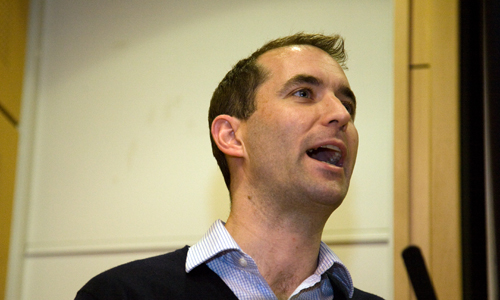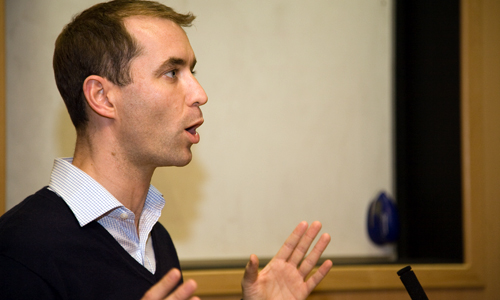Tom Clarke, Channel 4’s science correspondent, gave a rousing speech at the University of Lincoln on Monday, March 9, on the ups and downs of science reporting and where it sits in the news agenda, global warming and even explored the news coverage of animal testing.

Talking about his job at Channel 4 News, Clarke stated: “We have very little money. Channel 4 News has a public service remit and has a very low budget in relation to the other news programs like ITV and the BBC. This means we have to compete on a journalistic front with everyone else. We can’t send out all this equipment to wherever things are developing. Therefore, we have to find another newsworthy angle. Also when we go for something we have to make it better in terms of quality for it to be worth it.”
Having a scientific role for a news outlet can be hard. Tom Clarke explained that last year was very hard for him and the Channel 4 science team. A lot of the main stories had no relevant scientific capacity, like for example the US election and & Olympics. Clarke also stated that science has never really had a ‘place’ in the news agenda, like sport or hard news does.
“Sure, if there’s a story about a massive earthquake or a story involving a deadly outbreak of a disease then the science team will get good exposure to dealing with that story. However in the current climate of recession, there is hardly any scope for science at the moment. The only way we can really get scientific is showing people how to save by explaining benefits of energy saving can how to keep costs down in the average household.”
“If there’s an air crash I will be called in to try and find a scientific element. Like for example ‘how did the plane go down’ or ‘how would the pilot land the plane on the water’ etc. Also if you think back to the Polonium 2-10 incident the main story is the Russian dissident but there is the angle of ‘what is Polonium 2-10, how does it kill you, what are we going to do.’ Science correspondent, in you go…”
However, Clarke claims that over-reporting in this area, and like many others, can put people off it. He added that too many stories could run the risk of creating the ‘crying wolf’ impression when scientists should never guesstimate and, to credit Clarke’s phrase, never use ‘could be due to climate change.’ Furthermore, according to Clarke, scientists don’t really know where things will take us next.
“They [scientists] are looking for someone to hand over all of this research to. Because now, ever since the institutionalised walls in science broke down, there is a need to know about this research – mainly because it is publically funded and people have a right to know. Unfortunately, it is the policy makers that will change things.”
Curriculum Vitae

Tom Clarke started out as a scientist, studying insects in the cotton fields of the American Deep South. After leaving the lab, Tom trained in journalism in New York. He worked as a science producer for American National Public Radio and a science reporter for ABC television affiliate networks. Tom returned to his native England in 2000 and worked as a reporter for the science magazine Nature, before joining Channel 4 News in 2003.
As Science Correspondent for Channel 4 News, Tom Clarke’s beat varies from bird flu to climate change. He has covered energy and the environment in the frozen North as part of the first live news bulletin from inside the Arctic Circle. He met some of the world’s most endangered whales threatened by oil exploration in Russia’s far East, and followed the growing pains of the UK’s landmark Climate Change Bill.

Thanks for the speech. Another 18 month old egyptian gilrl may have the H5N1 strain.
Sadly the preps many are taking are not making the news — from growing food to being prepared for snow or a black out.
Since H5N1 continues to spread like a bad weed from country to country, now is the time to learn, talk and prepare.
Sir, may you continue to speak for many are listening.